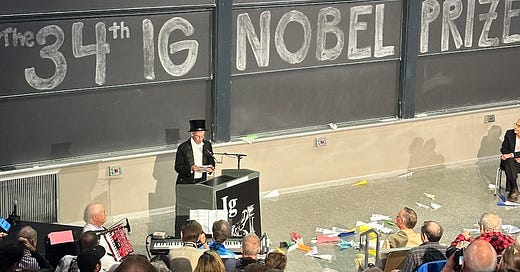I Flew Cross-Country to See the 2024 Ig Nobel Prizes
Plus recs for Rosemerry Wahtola Trommer's poetry, Amy Kurzweil's time travel, and Edith Zimmerman's cartoons.
If you’re not familiar with the Ig Nobel Prizes, they’re a lot like the Nobel Prizes. But instead of recognizing the most world-changing achievements in physics, chemistry, or peace, the Ig Nobels recognize the most hilarious or strangest discoveries of the year. Their slogan is “research that makes people laugh… then think.”
If you know anything about me, you already know that this is EXTREMELY up my alley.
Some of my favorite past Ig Nobel Prize winners over the years include:
A team of French professors who won the Ig Nobel Prize in Literature for studying the sensations people feel "when they repeat a single word many, many, many, many, many, many, many times.”
A University of Utah team who hypothesized that human men may have evolved beards because it would protect them against being attacked. They won the Ig Nobel Peace Prize for demonstrating precisely how much a very thick, bushy beard would blunt the impact of a punch.
Georgia Tech scientists who were awarded the Ig Nobel Prize in Physics for discovering a “universal urination duration.” Using fluid dynamics, they demonstrated that all mammals weighing over 3 kg take about 21 seconds to completely empty a full bladder.
This year was the 34th Annual First Annual Ig Nobel Prizes. It was the first time the award ceremony was returning in person since the pandemic. For years, I’ve dreamed about attending in person and this year, I finally had the perfect excuse. I’m in the final stages of writing my nonfiction book about the power of humor and how to laugh more. My editor and I agreed that the chapter on how humor can help you come up with better ideas needed more of a narrative. Coincidentally, my need for more of a story lined up with the ceremony so I was able to get tickets and head to MIT last week for a one day reporting trip. Dreams do come true!
I won’t give away too much of my experience, since I’ve got to save it for the book, but here were some memorable moments:
Several times throughout the ceremony, the audience is supposed to throw paper airplanes onto the stage. I was in a room surrounded by brilliant scientists and MIT engineers. All of their paper airplanes worked beautifully. Both of my planes did a u-turn as soon as I threw them and hit the guy sitting behind me in the face.
The ceremony runs on a tight timeline so instead of having music to play off the award winners when their speeches run long, the Ig Nobels have an eight year old child who walks on stage, stands directly in front of the podium, and says “I’m bored. Please stop.” It was incredibly effective at getting people to wrap things up.
After the ceremony, I met and chatted with the “permanent interim acting executive director” of the Museum of Bad Art. Absolutely incredible institution that deserves all of our support. “Art too bad to be ignored.”
The Ig Nobel awards were handed out by five actual Nobel Prize laureates. But there were only three seats onstage due to the fire code. So the five laureates were periodically shuffled in a ceremony called “The Rotation of the Laureates,” where several laureates would be brought back into the audience and new Nobel Prize winners would get their time on stage.
Every single award given out at the 2024 Ig Nobels made me laugh. A few that I have not stopped thinking about are:
The winner of the Demography prize who demonstrated that, contrary to all the press that “Blue Zones” have received (geographic regions where many people live past 100 years old), the one thing they all have in common is an almost complete lack of official birth/death records. In other words, most people who have been documented to be over 120 years old were likely just committing pension fraud.
The winners of the Botany prize, who “found evidence that some real plants imitate the shapes of neighboring artificial plastic plants.”
The Probability prize winners, a team of 50 researchers, who performed 350,757 experiments to show that “when a coin is flipped, it is slightly more likely to land on the same side as it started.”
Beautiful, hilarious research all around. I’ve got lots more to say, but you’ll have to wait for the book!
My projects and upcoming events:
TED TALK: How find laughter anywhere - My TED talk is out now! Please watch it and share it. Link
LOS ANGELES: Wrong Answers Only (LabX) - We’re coming back to Dynasty Typewriter on Wednesday, October 9th with three hilarious comedians, a scientific expert, and a night of lots of laughs and audience participation. Tickets go on sale soon, but mark your calendars now!
PODCAST: How to Be a Better Human (TED/PRX) - Brian Lowery is a professor at Stanford and an author who tackles questions of identity and self. He argues that we only exist in the context of other people. So the idea that you have one fixed, internal self isn’t actually true. This is a headier episode than we normally do, but I think it’s also a great one because Brian is so compelling. Check it out and let me know what you think! How to approach the daunting question: who am I? (w/ Brian Lowery)
This week’s list
GREAT:
Rosemerry Wahtola Trommer’s new poetry collection comes out on October 1st and you can pre-order it now. Pre-orders mean an enormous amount to authors and publishers. It’s one of the best ways you can support writers and their work. Rosemerry is one of my favorite living poets. She writes poems that are beautiful, full of hope and awe at the world. Her poems always contain a phrase or section that sticks with me long after reading. Especially in times like right now, where there’s so much dark, troubling news in the world, Rosemerry’s poems are a welcome alternative. In my opinion, they’re also very accessible, even if you’re a person who doesn’t think of yourself as liking poetry. Here’s a taste of some of her work. Her new collection is called The Unfolding and you can find more info here.
FUNNY:
Amy Kurzweil is a New Yorker cartoonist. She also happens to be the daughter of Ray Kurzweil, one of the most famous living technologists (and the man who popularized the idea of “The Singularity”). I’ve had the good fortune to meet Amy and she’s so witty and smart. This talk she gave, about using new technology to try and understand her family’s history, is much more than just funny. It’s moving and poignant too. But it’s got a lot of great punchlines so I’m putting it in the funny category of today’s email. I think Amy would approve. Time traveling with AI to connect with lost loved ones
Bonus: here’s one of my favorite Amy Kurzweil cartoons
INTERESTING:
I’m a huge fan of Edith Zimmerman and her work. She just re-launched her illustrated newsletter, Drawing Links, and if you don’t already subscribe, you should. Edith manages to tell stories from her daily life that are extremely specific and everyday and yet always feel so universal and relatable. There’s something about the way she draws the cartoons and her narrative style that also makes me feel like she’s able to tell personal stories without revealing too much or giving away too much of her family’s privacy. It’s a tough line to walk and I admire how she does it. But mostly, I just love reading her work. I found this check-in on her sobriety and what she’s grappling with now as a parent and an artist to be particularly beautiful. Trying to Figure Out Who I Am (Again)
I can’t resist also linking to the greeting cards she sells because they’re the ones I use most often and always get compliments on from the recipients.
BONUS FOR PAYING SUBSCRIBERS:
Paying subscribers make Bright Spots possible! Subscribers get access to special features as well as all posts in the archive. Paying subscribers also get my undying gratitude (which never dies). It’s never too late to join them!
That's it for this week. Thanks for reading! Please share Bright Spots with anyone you think might enjoy it.
Flipping a coin as I join AARP at my new current age of 95,
Chris Duffy
This has been Bright Spots, a newsletter.
…wait, who are you?
I'm Chris Duffy, a comedian, TV writer, podcast host, and both a former fifth grade teacher and a former fifth grade student. I’m currently writing a nonfiction book about humor for Doubleday.






Wow what a delightful event and you made me feel like I was there, Chris. My fave is the winner of the botany prize. So funny! I for sure gots to hunt that study down!
Never EVER underestimate the power of an eight year old child! You made me laugh out loud. Thank you for that, Chris.